
Sierra Leone,officially the Republic of Sierra Leone,is a country on the southwest coast of West Africa. It shares its southeastern border with Liberia,and the northern half of the nation is surrounded by Guinea. Covering a total area of 71,740 km2 (27,699 sq mi),Sierra Leone has a tropical climate,with diverse environments ranging from savanna to rainforests. The country has a population of 7,092,113 as of the 2015 census. Freetown is the capital and largest city. The country is divided into five administrative regions,which are subdivided into 16 districts.
Sierra Leone first became inhabited by indigenous African peoples at least 2,500 years ago. The Limba were the first tribe known to inhabit Sierra Leone. The dense tropical rainforest partially isolated the region from other West African cultures,and it became a refuge for peoples escaping violence and jihads. Sierra Leone was named by Portuguese explorer Pedro de Sintra,who mapped the region in 1462. The Freetown estuary provided a good natural harbour for ships to shelter and replenish drinking water,and gained more international attention as coastal and trans-Atlantic trade supplanted trans-Saharan trade.
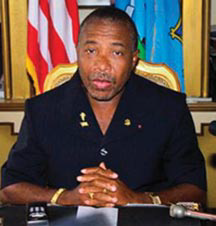
Charles McArthur Ghankay Taylor is a Liberian former politician and convicted war criminal who served as the 22nd president of Liberia from 2 August 1997 until his resignation on 11 August 2003 as a result of the Second Liberian Civil War and growing international pressure.
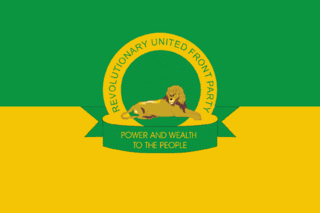
The Revolutionary United Front (RUF) was a rebel group that fought a failed eleven-year war in Sierra Leone,beginning in 1991 and ending in 2002. It later transformed into a political party,which still exists today. The three most senior surviving leaders,Issa Sesay,Morris Kallon and Augustine Gbao,were convicted in February 2009 of war crimes and crimes against humanity.

Alhaji Ahmad Tejan Kabbah was a Sierra Leonean politician who served twice as the 3rd President of Sierra Leone,from 1996 to 1997 and again from 1998 to 2007. An economist and attorney by profession,Kabbah spent many years working for the United Nations Development Programme. He retired from the United Nations and returned to Sierra Leone in 1992.
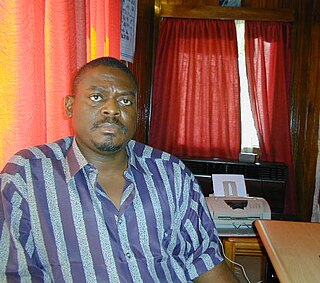
Major Johnny Paul Koroma was a Sierra Leonean military officer who was the head of state of Sierra Leone from May 1997 to February 1998.

The United Nations Mission in Sierra Leone (UNAMSIL) was a United Nations peacekeeping operation in Sierra Leone from 1999 to 2006. It was created by the United Nations Security Council in October 1999 to help with the implementation of the LoméPeace Accord,an agreement intended to end the Sierra Leonean civil war. UNAMSIL expanded in size several times in 2000 and 2001. It concluded its mandate at the end of 2005,the Security Council having declared that its mission was complete.

The First Liberian Civil War was the first in a series of two civil wars within the West African nation of Liberia. It lasted from 1989 to 1997. President Samuel Doe had established a regime in 1980 but totalitarianism and corruption led to unpopularity and the withdrawal of support from the United States by the late 1980s. The National Patriotic Front of Liberia (NPFL) led by Charles Taylor invaded Liberia from the Ivory Coast to overthrow Doe in December 1989 and gained control over most of the country within a year. Doe was captured and executed by the Independent National Patriotic Front of Liberia (INPFL),a splinter faction of the NPFL led by Prince Johnson,in September 1990. The NPFL and INPFL fought each other for control of the capital city,Monrovia and against the Armed Forces of Liberia and pro-Doe United Liberation Movement of Liberia for Democracy. Peace negotiations and foreign involvement led to a ceasefire in 1995 but fighting continued until a peace agreement between the main factions occurred in August 1996. Taylor was elected President of Liberia following the 1997 Liberian general election and entered office in August of the same year.
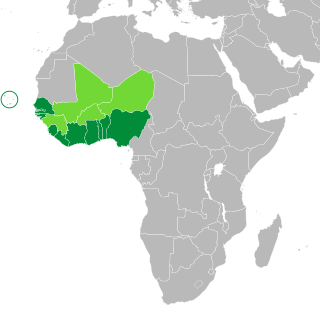
The Economic Community of West African States Monitoring Group (ECOMOG) was a West African multilateral armed force established by the Economic Community of West African States (ECOWAS). ECOMOG was a formal arrangement for separate armies to work together. It was largely supported by personnel and resources of the Nigerian Armed Forces,with sub-battalion strength units contributed by other ECOWAS members —Ghana,Guinea,Sierra Leone,The Gambia,Liberia,Mali,Burkina Faso,Niger,and others.

Julius Maada Wonie Bio is a Sierra Leonean politician,and the current president of Sierra Leone since 4 April 2018. He is a retired brigadier in the Sierra Leone Army and was the military head of state of Sierra Leone from 16 January 1996 to 29 March 1996,in a military junta government known as the National Provisional Ruling Council (NPRC).
The Armed Forces Revolutionary Council (AFRC) was a group of Sierra Leone soldiers that allied itself with the rebel Revolutionary United Front in the late 1990s. While the AFRC briefly controlled the country in 1998,it was driven from the capital by an international military intervention of the Economic Community of West African States Monitoring Group (ECOMOG). It was no longer a coherent and effective organization by the elections of 2002.
The Sierra Leone Civil War (1991–2002),or the Sierra Leonean Civil War,was a civil war in Sierra Leone that began on 23 March 1991 when the Revolutionary United Front (RUF),with support from the special forces of Liberian dictator Charles Taylor's National Patriotic Front of Liberia (NPFL),intervened in Sierra Leone in an attempt to overthrow the Joseph Momoh government. The resulting civil war lasted 11 years,enveloping the country. It left over 50,000 dead.
The National Patriotic Front of Liberia (NPFL) was a Liberian rebel group that initiated and participated in the First Liberian Civil War from 24 December 1989 –2 August 1997. The NPFL emerged out of rising ethnic tensions and civil unrest due to the Liberian government that was characterized by totalitarianism,corruption,and favoritism towards ethnic Krahns. The NPFL invaded Liberia through Ivory Coast’s border with Nimba County in Liberia under the direction of Charles Taylor,a former Liberian politician and guerrilla leader who served as the 22nd president of Liberia from 2 August 1997 until his resignation on 11 August 2003.
Samuel Hinga Norman was a Sierra Leonean politician from the Mende tribe. He was the founder and leader of the Civil Defence Forces,commonly known as the Kamajors. The Kamajors supported the government of Ahmed Tejan Kabbah against the Revolutionary United Front(RUF),which was led by Foday Sankoh. On 7 March 2003 Hinga Norman was indicted by the Special Court for Sierra Leone for war crimes and crimes against humanity. He died on 22 February 2007 in Dakar,Senegal while undergoing medical treatment.
The Kamajors were a group of traditional hunters from the Mende ethnic group in the south and east of Sierra Leone. The word "Kamajor" derived from Mende "kama soh",meaning traditional hunter with mystical powers,who were originally employed by local chiefs.
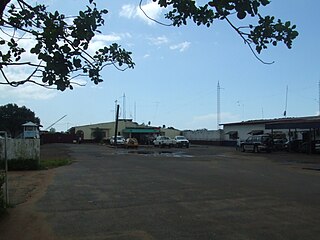
James Spriggs Payne Airport is an airport located 5 kilometres (3 mi) from downtown Monrovia,the capital of the Republic of Liberia in West Africa. The airfield is located within the busy and thickly settled Sinkor section of the city,and is therefore convenient to the business and political districts of the capital. Whereas Roberts International Airport is the primary aviation facility for the city and indeed the entire country,Spriggs-Payne has the only other paved runway in Liberia and only other international commercial flights into and out of Liberia. The airport is named after James Spriggs Payne who was president of the Republic of Liberia in 1868–70 and again in 1876–78.

Major General Alfred Claude Nelson-Williams,GCOR is a retired Major General in the Republic of Sierra Leone Armed Forces (RSLAF). Nelson-Williams previously served as Chief of Defense Staff for Sierra Leone from 2008 to 2010.

United Nations Security Council resolution 1231,adopted unanimously on 11 March 1999,after recalling resolutions 1181 (1998) and 1220 (1999) on the situation in Sierra Leone,the Council extended the mandate of the United Nations Observer Mission in Sierra Leone (UNOMSIL) until 13 June 1999.
The United Kingdom began a military intervention in Sierra Leone on 7 May 2000 under the codename Operation Palliser. Although small numbers of British personnel had been deployed previously,Palliser was the first large-scale intervention by British forces in the Sierra Leone Civil War. In early May 2000,the Revolutionary United Front (RUF)—one of the main parties to the civil war—advanced on the country's capital,Freetown,prompting the British government to dispatch an "Operational Reconnaissance and Liaison Team" (ORLT) to prepare to evacuate foreign citizens. On 6 May,the RUF blocked the road connecting Freetown to the country's main airport,Lungi. The next day,British soldiers began to secure the airport and other areas essential to an evacuation. The majority of those who wished to leave were evacuated within the first two days of the operation,but many chose to stay following the arrival of British forces.

The United Nations Observer Mission in Sierra Leone (UNOMSIL) was a United Nations peacekeeping operation in Sierra Leone from 1998 to 1999 that was established with the passage of United Nations Security Council Resolution 1181. Its mission was to monitor the military and security situation in Sierra Leone. The mission was terminated in October 1999,when the Security Council authorized deployment of a new,and significantly larger peacekeeping operation,the United Nations Mission in Sierra Leone (UNAMSIL).












